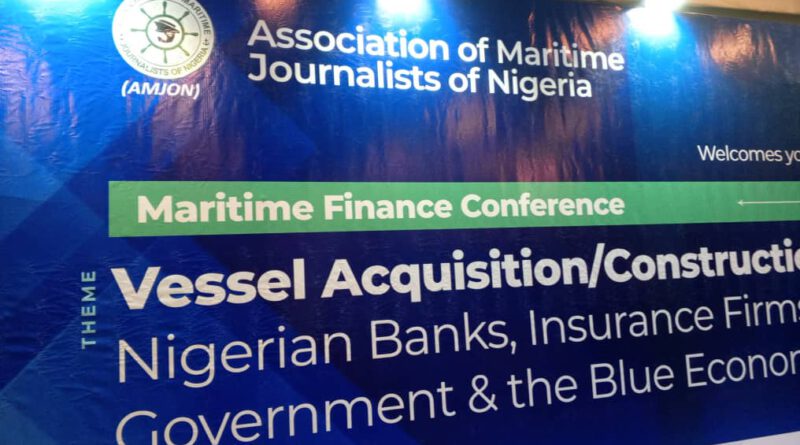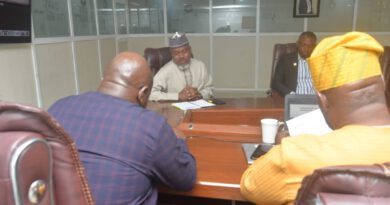Cabotage Vessel Financing Fund (CVFF): NIMASA Pledges Of Effective Use To Support Acquisition, Construction Of Vessels Own By Nigerians
By Raheem Ibrahim
The Nigerian Maritime Administration and Safety Agency (NIMASA) has pledged that the funds generated from NIMASA partnership with the various international stakeholders, including the UK and global LNG firms, which has provided Nigerian cadets with invaluable sea-time experience will be use in the acquisition and construction of vessels to be own by the country.
The Director General of NIMASA, Dr. Dayo Mobereola gave the assurance at the 2024 Maritime Finance Conference organised by the Association of Maritime Journalists of Nigeria in collaboration with the NLNG Shipping and Marine Service Limited held at Sheraton hotel, Lagos.
The DG, who was represented by the Director of Administration and Human Resources, Mr. Isichei Osamgbi at event assured NIMASA commitment to advancing fleet expansion and maritime development in the country.
He emphasised, “NIMASA will make sure that the funds realized from ensuring that funds from the Cabotage Vessel Financing Fund (CVFF) are channeled effectively to support the acquisition and construction of vessels by Nigerian entities”.
With the theme of the conference, which was “Vessel Acquisition/Construction: Nigerian Banks, Insurance Firms, Government and The Blue Economy”, Mobereola highlighted the critical role of shipping as an economic driver and emphasised the need for a renewed focus on vessel acquisition and construction.
He said, “Shipping is one of the greatest energizers of the economy globally. If any digital company has laid the foundation for growth and development in Nigeria, shipping should be at the forefront”.
“Many of our sea cadets are now gaining experience across the globe thanks to these partnerships,” Osamgbi noted, highlighting the agency’s efforts to equip over a thousand cadets with the necessary skills to manage various vessels,” he stated.
He also touched on the strategic importance of fleet ownership, which is expected to enhance Nigeria’s economic standing and retain more wealth within the country.
According to him, “When Nigerians can acquire vessels and own fleets, it will lead to increased job opportunities, and the economy will flourish”, pointing out that the enforcement of laws regarding the Nigerian fleet and cargo allocation will play a crucial role in achieving these goals.
The DG however called on the media to play a proactive role in shaping the narrative around Nigeria’s maritime industry, much like it did during the country’s democratic transition.
He assured of NIMASA’s dedication to its mission, emphasising that the agency is committed to fleet expansion and other initiatives aimed at improving safety and security in Nigeria’s maritime domain.
Meanwhile, the President of AMJON, Mr Paul Ogbuokiri called for collaborative solutions in vessel acquisition, blue economy growth.
The Association of Maritime Journalists of Nigeria (AMJON) has
In his welcome address, Ogbuokiri emphasised the urgency of bridging the financing gap in the maritime industry, which has hindered the development of Nigeria’s blue economy, as the government seeks to diversify its revenue streams.
The event, which was co-hosted by NLNG Shipping and Marine Services Limited (NSML), drew industry leaders, government officials, and financial experts together to address the pressing financing gaps hampering the growth of Nigeria’s maritime sector and the broader blue economy.
Ogbuokiri underscored the association’s commitment to nation-building through informed reporting and advocacy.
He said the theme of this year’s conference was carefully chosen to bring together regulators, investors, financiers, and insurers to find a solution to the challenges retarding the growth of the Nigerian maritime industry.
The AMJON president said this is particularly crucial as the country looks to fully exploit its blue economy resources, especially with the establishment of the Ministry of Marine and Blue Economy.
The AMJON President also extended his gratitude to NSML for their collaboration, emphasising the importance of collective efforts in addressing the challenges facing the maritime sector.
“With the government’s focus on diversifying the economy and boosting revenue, the time for all hands to be on deck in developing the Nigerian maritime industry is now,” he concluded.
He urged stakeholders to engage in deep discussions on fostering greater collaboration between the financial sector, government, and maritime industry players to unlock the full potential of Nigeria’s blue economy.




